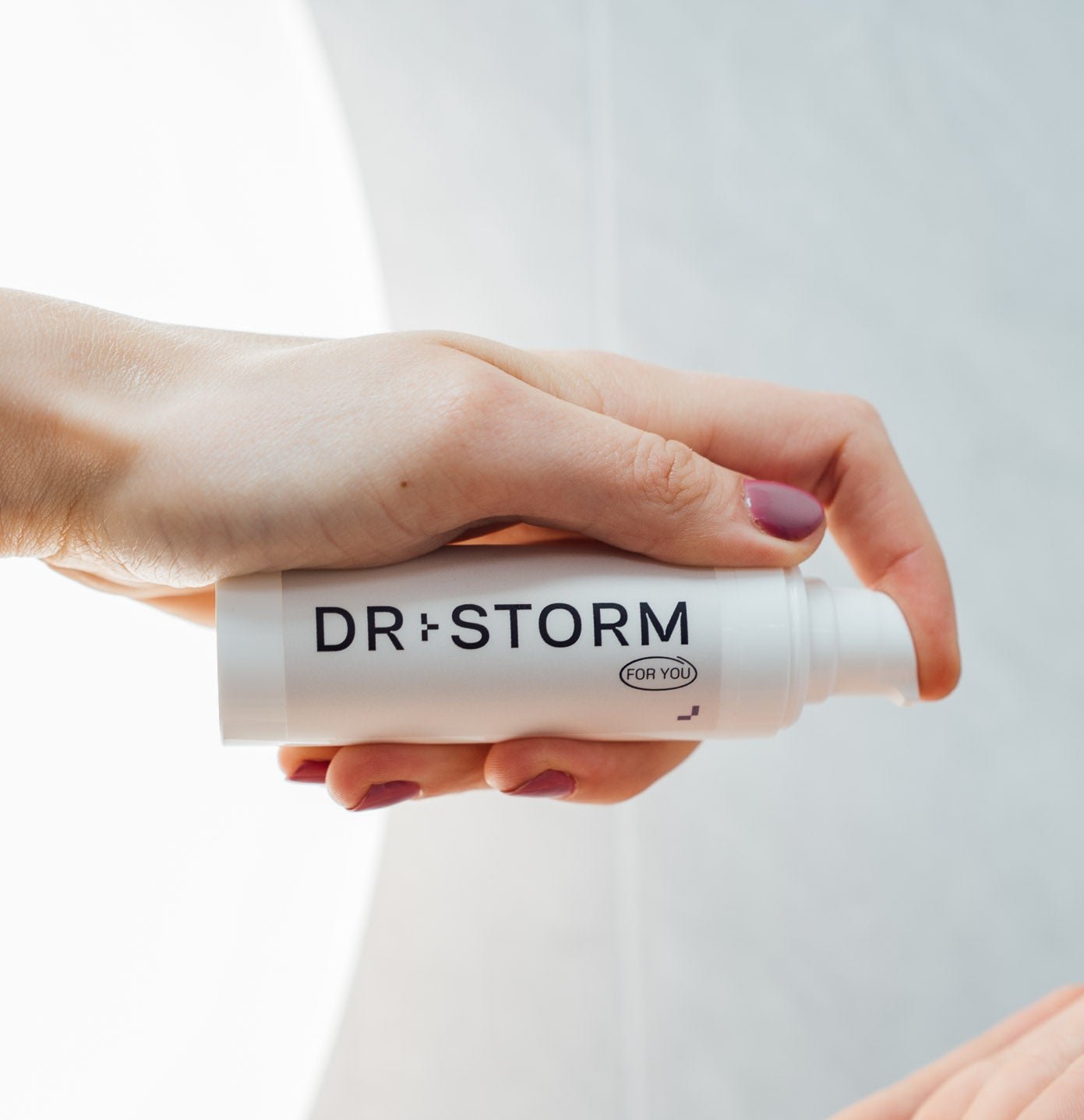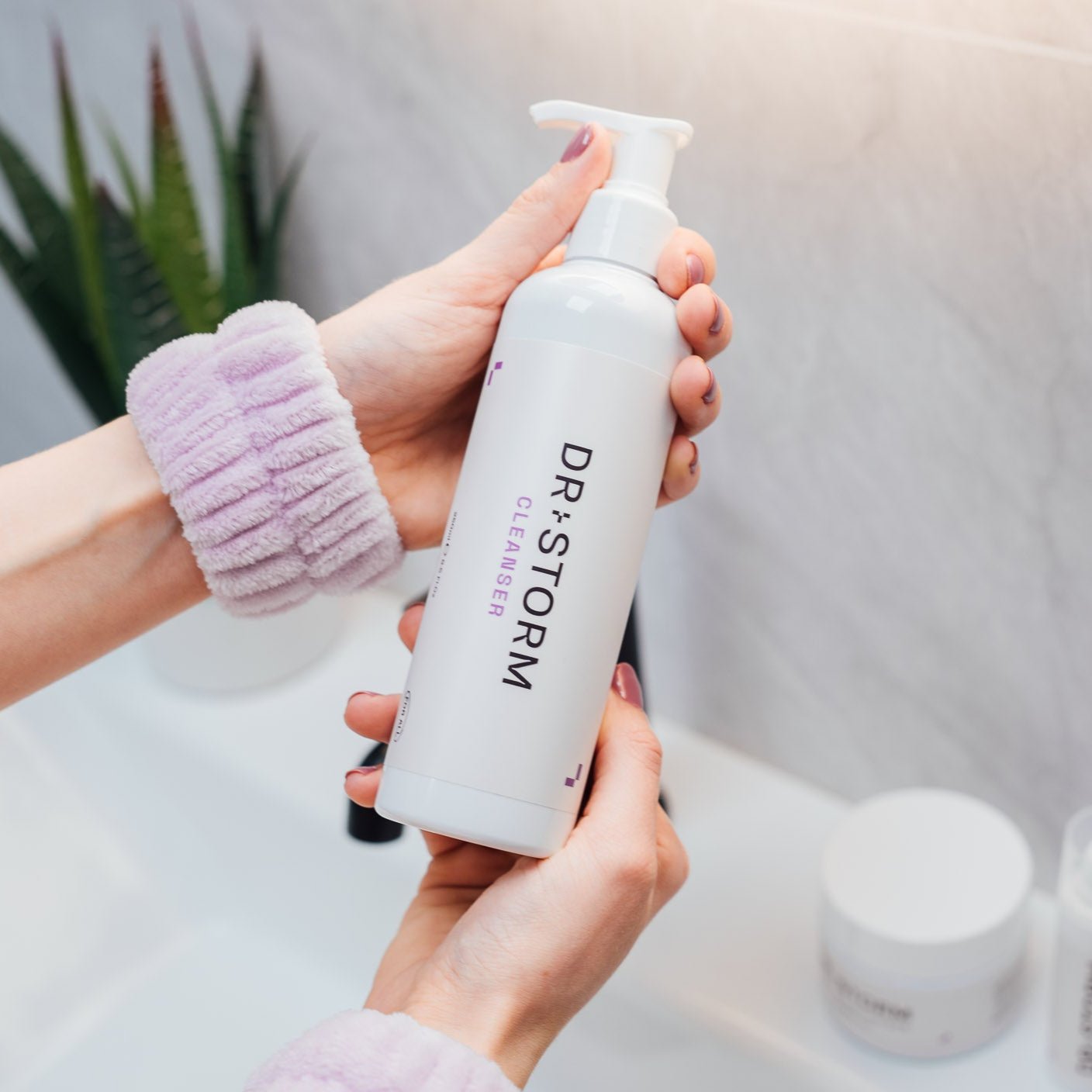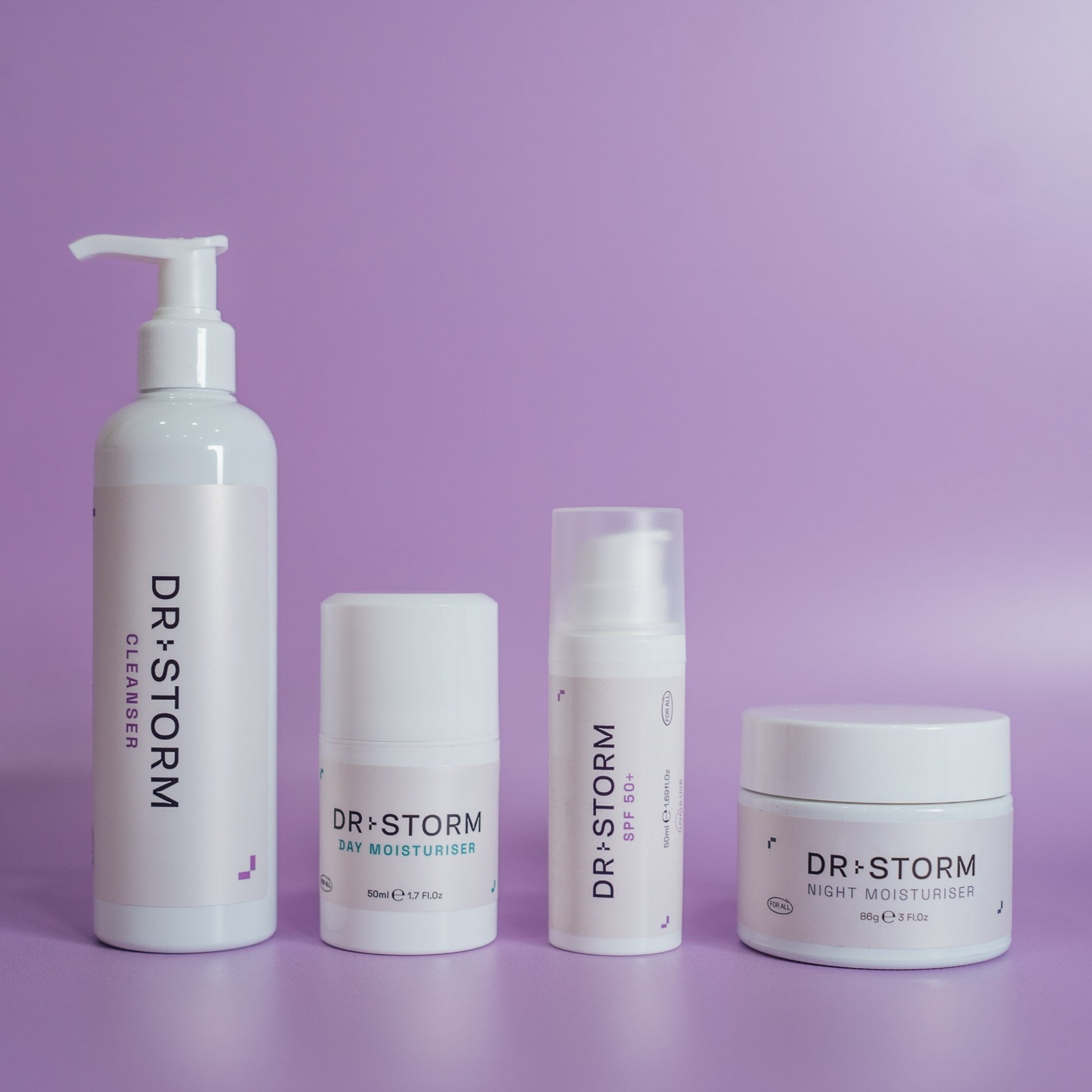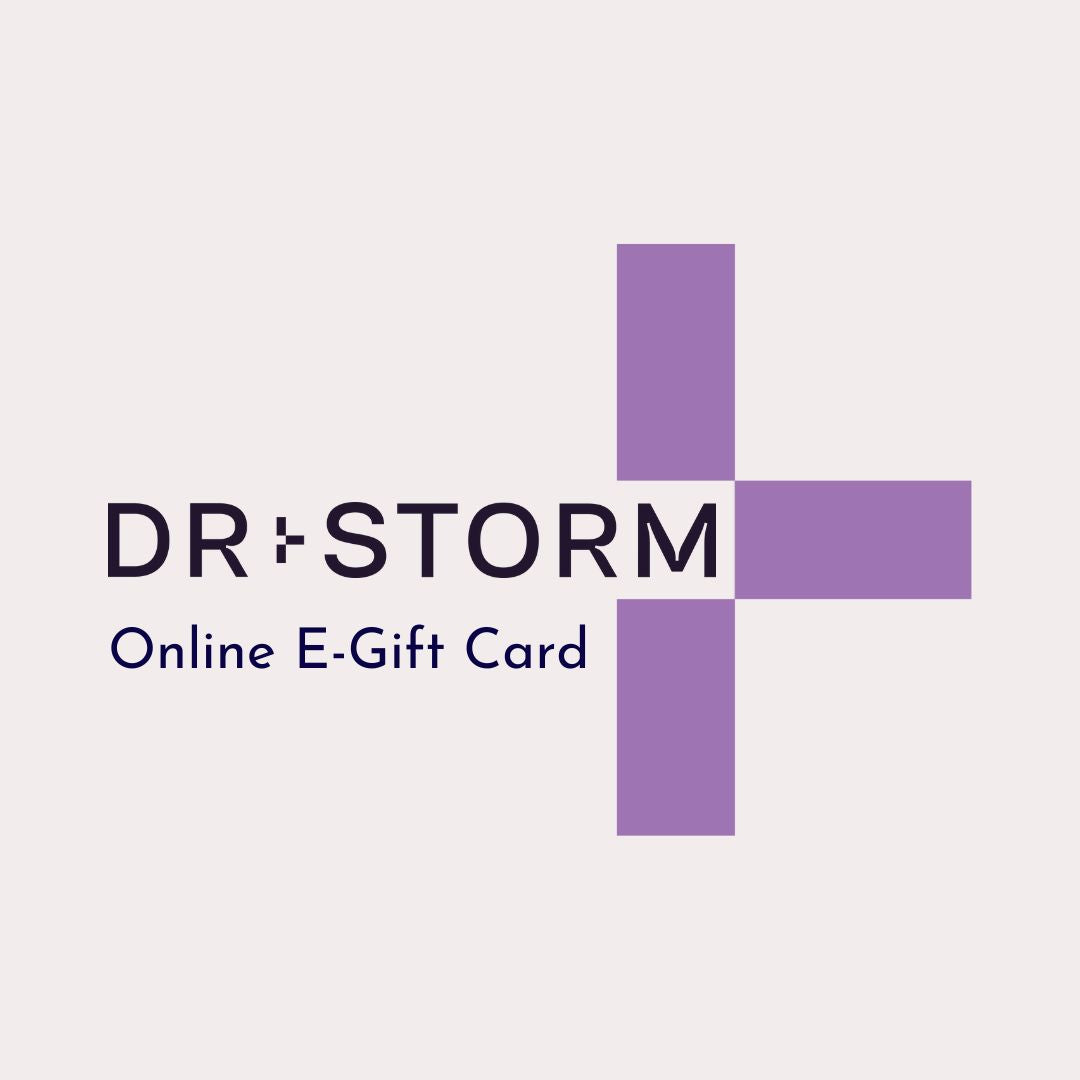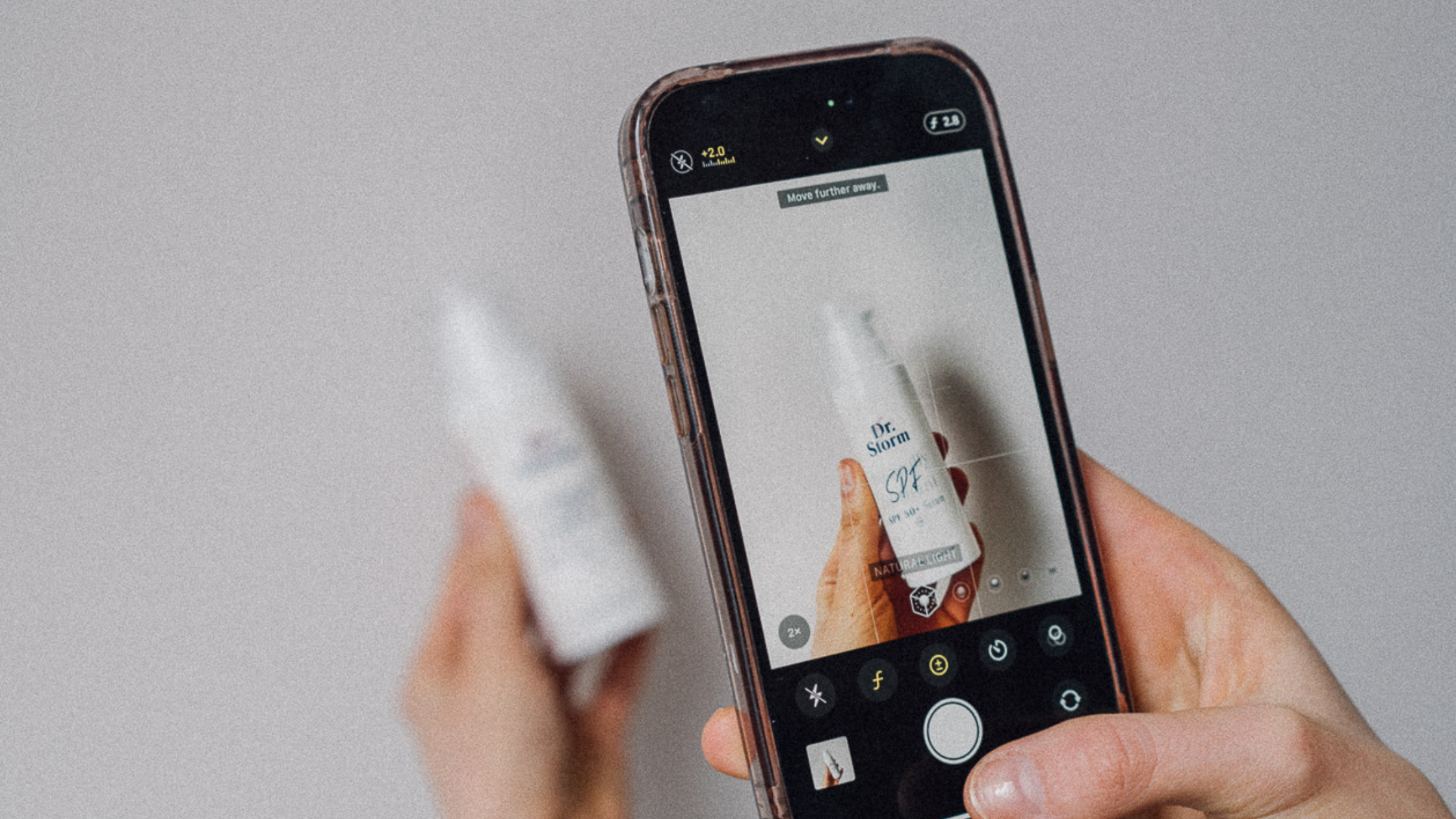Acne, an unwelcome visitor on our skin, often demands more than over-the-counter acne treatments. For those struggling with persistent or severe breakouts, exploring prescription acne medications is a crucial step towards reclaiming clear, confident skin. In our journey to unveil the most effective acne treatment options, we advise a medical approach that goes beyond over-the-counter products.
At Dr. Storm, we firmly believe in leveraging the expertise of medical professionals and evidence-based treatments to combat acne. In this comprehensive guide, we dive into the realm of prescription acne medications and solutions, including antibiotics, tretinoin, oral contraceptives, spironolactone, and isotretinoin(roaccutane). Each of these options have benefits and potential drawbacks, and understanding their nuances empowers individuals to make informed decisions about their skincare journey.
Our mission is to equip you with the knowledge and insights necessary to navigate acne treatment options confidently, guided by medical evidence that prioritises safety, efficacy, and long-term skin health.
Tretinoin (a topical retinoid) for Acne Treatment
One of our foundational approaches in treating mild acne involves using tretinoin. As one of the most extensively researched ingredients in skincare, tretinoin has many benefits in helping mild acne.
How does tretinoin work for acne?
- Tretinoin is a topical retinoid derived from vitamin A. It promotes cell turnover and prevents the formation of closed comedones, which are characteristic of acne.
- Tretinoin helps to unclog pores, reduce the formation of new acne lesions, and improve overall skin texture and tone.
- Tretinoin has anti-inflammatory properties, which can help reduce redness and inflammation associated with acne lesions.
- It is commonly used in the treatment of mild to moderate acne and is available in various formulations, including creams, gels, and lotions.
Tretinoin Benefits for Acne:
- It is accessible to most people after a private consultation with a doctor or prescribing medical professional (in the UK) and easy to use over a long period of time…in fact you should aim to use it for life if you are concerned about aging skin!
- Through our online personalised service, it can be made in a variety of different strengths to suit your skin's needs and goals
- Tretinoin stimulates collagen production, reducing the appearance of fine lines and wrinkles and improving skin firmness and elasticity.
- Tretinoin helps fade dark spots, hyperpigmentation, and sun damage, resulting in a more even complexion.
- Tretinoin promotes skin cell turnover leading to smoother, softer skin
- General Skin Health: Tretinoin strengthens the skin's natural defences, protecting against environmental damage and maintaining a healthy, youthful appearance.
Tretinoin Drawbacks for Acne:
- Initial side effects such as dryness, peeling, and irritation may occur, especially during the first few weeks of use.
- Increased sensitivity to sunlight in the very short term. It's essential to use sunscreen regularly and avoid prolonged sun exposure.
- It may cause temporary worsening of acne before improvement occurs, known as the "purging" period (this is extremely rare and if it does happen, it is generally short-lived and totally worth it, in our opinion!)
- Not suitable for use during pregnancy due to potential risks to the fetus.
- Requires consistent and long-term use to maintain results, as discontinuation may lead to a recurrence of acne.
Lymecycline for Acne Treatment (Oral Antibiotic)
Sometimes, tretinoin alone won’t be enough to tackle more persistent or severe acne. Our next line of defence here would be to try a combination approach of both tretinoin and oral antibiotics.
How does lymecycline work for acne?
- Lymecycline belongs to the tetracycline class of antibiotics and is used to treat bacterial infections, including acne.
- Acne is often associated with the proliferation of Propionibacterium acnes (P. acnes), a type of bacteria that contributes to the development of acne lesions.
- Lymecycline inhibits the growth of P. acnes bacteria, reducing inflammation and preventing the formation of new acne lesions.
- It is typically prescribed for moderate to severe acne or cases where topical treatments alone are not sufficient to control the condition.
Benefits of Oral Antibiotics for Acne:
- They can be effective at treating moderate to severe acne by inhibiting the growth of acne-causing bacteria, particularly Propionibacterium acnes (P. acnes).
- Can lead to a significant reduction in inflammatory acne lesions such as papules, pustules, nodules, and cysts.
- Oral administration allows for widespread distribution throughout the body, targeting acne lesions beyond the reach of topical treatments.
- Generally well-tolerated, with side effects such as gastrointestinal upset or photosensitivity being relatively uncommon and usually mild.
- Provides a systemic approach to acne treatment, complementing the effects of topical treatments like tretinoin.
Drawbacks of Oral Antibiotics for Acne:
- May take several weeks to months to see noticeable improvements in acne, requiring patience and persistence.
- Potential side effects include gastrointestinal upset (e.g. nausea, vomiting, diarrhoea), photosensitivity, and yeast infections.
- Not suitable for long-term use due to the risk of antibiotic resistance and potential adverse effects on gut microbiota.
- It requires a prescription and regular follow-up with a healthcare professional to monitor and adjust treatment. (At Dr Storm, we love to check in and see how you are doing and we are always here if you need further advice!)
The Contraceptive Pill for Acne Treatment
The contraceptive pill, also known as birth control pills, can help with acne primarily by regulating hormone levels, particularly oestrogen and progesterone.
How do oral contraceptives reduce acne?
Hormonal fluctuations, particularly of androgens, can contribute to the development of acne. Oral contraceptives contain synthetic versions of oestrogen and progesterone, which work together to regulate hormone levels in the body.
Benefits of Birth Control Pills for Acne:
- Reduction of Androgen Levels: Progesterone in oral contraceptives can help reduce the production of androgens, such as testosterone in the body. High levels of androgens can stimulate the sebaceous glands to produce excess oil (sebum), which can lead to clogged pores and acne breakouts. By decreasing androgen levels, oral contraceptives can help reduce sebum production and prevent acne formation.
- Stabilisation of Menstrual Cycles: Oral contraceptives can help stabilise menstrual cycles by regulating ovulation and hormone levels throughout the menstrual cycle. Fluctuations in hormone levels during the menstrual cycle can trigger acne flare-ups, particularly in females with hormonal acne. By stabilising hormone levels, oral contraceptives can reduce the frequency and severity of hormonal acne breakouts.
- Anti-inflammatory Effects: Some oral contraceptives have anti-inflammatory properties, which can help reduce the redness, swelling, and inflammation associated with acne lesions. By decreasing inflammation, oral contraceptives can help improve the appearance of acne and promote healing.
- Decrease in Sebum Production: Oestrogen in oral contraceptives can help decrease the production of sebum (skin oil) by the sebaceous glands. Excess sebum production can contribute to the development of acne by clogging pores and providing an ideal environment for acne-causing bacteria to thrive. By reducing sebum production, oral contraceptives can help prevent the formation of acne lesions and improve overall skin health.
- Additional Benefits: Oral contraceptives offer additional benefits beyond acne treatment, such as regulating menstrual cycles, reducing menstrual cramps, and preventing pregnancy.
Drawbacks of Birth Control Pills for Acne:
- Side effects of birth control pills for acne: Like any medication, oral contraceptives can have side effects. Common side effects may include nausea, breast tenderness, mood changes, and breakthrough bleeding.
- Risk of Blood Clots: Some oral contraceptives may increase the risk of blood clots, particularly in individuals with certain risk factors such as smoking, obesity, or a history of blood clots.
- Not Suitable for Everyone: Oral contraceptives are not suitable for everyone, including individuals with certain medical conditions such as liver disease, heart disease, or a history of breast cancer. It is not suitable for all genders, including those hoping to conceive.
- Requires Prescription: Oral contraceptives are prescription medications, so they require consultation with a healthcare provider before use. A healthcare provider will assess factors such as medical history, current medications, and individual risk factors before prescribing oral contraceptives for acne treatment.
- Time to See Results: It may take several months of consistent use before noticeable improvements in acne are observed with oral contraceptives. Patience and persistence are key when using oral contraceptives for acne treatment.
It's important to note that not all oral contraceptives are equally effective in treating acne. Certain formulations containing specific types and doses of oestrogen and progesterone may be more effective than others. Additionally, oral contraceptives are typically prescribed for females with moderate to severe acne that is hormonally influenced and may not be suitable for all individuals. It's essential to consult with a healthcare provider to help with choosing the right contraceptive pill for acne.
Spironolactone for Hormonal Acne
Spironolactone is a medication primarily used to treat conditions such as high blood pressure, heart failure, and oedema (fluid retention). However, it has also been found that spironolactone can be effective for hormonal acne.
- Spironolactone is an anti-androgen, meaning it blocks the body's androgens (male hormones) effects. Androgens, such as testosterone, can stimulate the sebaceous glands to produce excess oil (sebum), which can lead to clogged pores and acne breakouts. By blocking the effects of androgens, spironolactone helps reduce sebum production, which in turn can prevent acne formation.
- Spironolactone helps stabilise hormone levels in the body. Fluctuations in hormone levels, especially during the menstrual cycle, can trigger acne flare-ups in some individuals. By stabilising hormone levels, spironolactone can reduce the frequency and severity of hormonal acne breakouts.
Spironolactone Benefits for Acne Treatment
- Effective for Hormonal Acne: Spironolactone is particularly effective for treating hormonal acne, especially in adult women who experience acne flare-ups related to hormonal fluctuations.
- Reduction of Sebum Production: Spironolactone decreases sebum production by inhibiting androgens' action on the sebaceous glands. This reduction in sebum production helps to unclog pores and prevents the formation of new acne lesions.
- Anti-Androgenic Properties: As an anti-androgen, spironolactone blocks the effects of androgens in the body, helping alleviate symptoms of androgen excess such as acne, hirsutism (excessive hair growth), and hair loss.
- Anti-Inflammatory Properties: Spironolactone has anti-inflammatory properties, which can help reduce the redness, swelling, and inflammation associated with acne lesions. By decreasing inflammation, spironolactone can help improve the appearance of existing acne and promote healing.
- Long-Term Maintenance: Spironolactone can be used as a long-term maintenance therapy for acne, helping prevent acne breakout recurrence over time. It is often prescribed for females who have not responded well to other acne treatments or who experience frequent relapses.
Drawbacks of Spironolactone for Acne Treatment
- Side Effects: Spironolactone can cause side effects, including dizziness, lightheadedness, headache, fatigue, menstrual irregularities, breast tenderness, and electrolyte imbalances (such as hyperkalemia). These side effects are generally mild and reversible but can be bothersome for some individuals.
- Monitoring requirements for spironolactone acne therapy: regular monitoring of blood pressure, electrolytes (particularly potassium), and kidney function may be necessary while taking spironolactone, especially at higher doses or with long-term use.
- Not Suitable for Everyone: Spironolactone is typically prescribed for females with hormonally influenced acne and may not be suitable for males or premenopausal females who are pregnant or trying to conceive. It is also contraindicated in individuals with certain medical conditions, such as kidney disease or hyperkalemia.
- Slow Onset of Action: It may take several weeks to months to see noticeable improvements in acne with spironolactone, as it gradually regulates hormone levels and reduces sebum production.
- Requires Prescription: Spironolactone is a prescription medication and must be obtained from a healthcare provider. Before starting treatment, it is essential to discuss the potential risks and benefits of spironolactone with a healthcare provider.
It's essential to weigh the potential benefits and risks and discuss treatment options with a healthcare provider to determine if spironolactone is right for your acne management.
Roaccutane/Isotretinoin for Severe Acne
Roaccutane, also known as isotretinoin, is a potent oral medication used to treat severe, hard to manage acne that has not responded adequately to other treatments.
How do I get Roaccutane?
- Before starting Roaccutane treatment, individuals must undergo a thorough evaluation by a dermatologist. This evaluation includes a discussion of medical history, acne severity, previous treatments, and potential risks and benefits of Roaccutane therapy.
- If appropriate, the healthcare provider will prescribe Roaccutane at a specific dosage based on factors such as body weight, acne severity, and response to treatment. Roaccutane is available in various dosage strengths, and the dosage may be adjusted during treatment.
- Roaccutane is typically taken orally once or twice daily with food to enhance absorption and minimise gastrointestinal side effects. It's essential to take Roaccutane exactly as the healthcare provider prescribes and adhere to the recommended dosage and schedule.
- The duration of Roaccutane treatment varies depending on individual response and acne severity. Treatment courses typically last for several months, ranging from 4 to 6 months on average. Some individuals may require longer treatment courses to achieve optimal results.
Benefits of isotretinoin therapy for acne:
- Highly Effective: Roaccutane is highly effective in treating severe, stubborn acne that has not adequately responded to other treatments. It can significantly improve or completely clear acne lesions in many individuals.
- Long-lasting Results: Roaccutane treatment can provide long-lasting remission of acne symptoms, with some individuals experiencing sustained improvement even after completing the prescribed course of treatment.
- Reduces Sebum Production: Roaccutane works by reducing the size and activity of the sebaceous glands, leading to a significant decrease in sebum (skin oil) production. This reduction helps prevent clogged pores and acne breakouts.
- Using isotretinoin to prevent acne scarring: By effectively treating severe acne lesions, Roaccutane can help prevent the formation of permanent acne scars, leading to improved skin texture and appearance.
- Improves Quality of Life: Clearing severe acne can have a profound impact on an individual's quality of life, boosting self-esteem, confidence, and overall well-being.
Drawbacks of of isotretinoin therapy for acne:
There can be side effects of Roaccutane treatment, some of which can be severe. Common side effects may include dry skin, lips, and eyes, nosebleeds, muscle or joint pain, and temporary worsening of acne. More serious side effects may include birth defects (if taken during pregnancy), liver toxicity, elevated blood lipid levels, and psychiatric symptoms.
- Pregnancy Risk: Roaccutane is contraindicated in pregnant women and women who may become pregnant during treatment due to the risk of severe birth defects. Females of childbearing potential must adhere to strict contraceptive measures before, during, and after Roaccutane treatment to prevent pregnancy.
- Requires Monitoring: Roaccutane treatment requires close monitoring by a healthcare provider to assess treatment response, monitor for potential side effects, and adjust dosage or treatment duration as needed. Regular follow-up appointments are necessary throughout the course of treatment.
- Potential for Relapse: While Roaccutane can provide long-lasting remission of acne symptoms in many individuals, some may experience acne recurrence after completing treatment. Additional courses of Roaccutane or maintenance therapy may be required to prevent acne relapse.
- Strict Treatment Protocol: Requires strict adherence to a treatment protocol, including regular blood tests, contraceptive measures, and participation and pregnancy prevention measures during Roaccutane treatment. Failure to adhere to these requirements can compromise treatment safety and effectiveness.
In summary, Roaccutane is a potent oral medication used for the treatment of severe acne that has not responded adequately to other treatments. While highly effective in providing long-term results, Roaccutane requires careful monitoring, adherence to contraception measures, and management of potential side effects to ensure safe and successful treatment outcomes. It is essential to discuss the risks and benefits of Roaccutane therapy with a healthcare provider and to follow their guidance throughout the treatment process.
While each treatment has its pros and cons, the overarching goal remains the same: to provide individuals with clear, confident skin and prevent the formation of lasting scars. We encourage readers to reach out to us to explore personalised acne treatment options tailored to their specific needs and goals. With a medical perspective that prioritises safety, efficacy, and long-term skin health, we are committed to guiding individuals on their journey towards acne management and achieving optimal skin health.
--
Disclaimer:
It's important to note that the information provided in this blog is intended for educational purposes only and should not be considered a substitute for professional medical advice, diagnosis, or treatment. While we strive to offer accurate and up-to-date information, individual circumstances may vary, and medical recommendations should always be tailored to each person's specific needs and health history.
Therefore, we strongly advise readers to consult with a qualified healthcare professional before initiating any new treatment or making changes to their current skincare regimen. A healthcare provider can offer personalised guidance based on a thorough evaluation of your medical history, skin condition, and other relevant factors.
Additionally, if you experience any concerning symptoms or adverse reactions related to skincare products or treatments, it's essential to seek prompt medical attention. Your healthcare provider is the best resource for addressing any health-related concerns and ensuring your safety and well-being.
By accessing and using the information provided in this blog, you acknowledge and agree to the importance of consulting with a medical professional for personalised healthcare advice and treatment recommendations.

